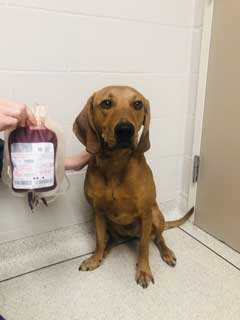September 15, 2021
Veterinary Health Center looking for K9 blood donors

Meet Red, a 2-year-old redbone coonhound who is a blood donor in the K-State's Veterinary Health Center blood donor program.
In 2020, while his owner was a vet student, Red enrolled in the donor program. To be able to participate in the program, he came into the center for two screenings to see if he could be a donor, and he successfully passed. Since joining the program, Red has donated six times, which means he has helped save 12 lives. When he is not donating blood, he thoroughly enjoys anything that has to do with food, car rides, or going outside. He is full of energy and loves coming into the center for treats, snuggles and helping other dogs in need.
If you think your dog could be like Red, please see the following requirements to be a canine blood donor at the Veterinary Health Center. The K-State Veterinary Health Center is looking for volunteer K-9 blood donors.
Just like people, dogs have diseases or injuries that require blood transfusions. Many canine patients receive transfusions and dogs enrolled in the canine blood donor program provide the blood products for them. The demand for blood products for our patients increases every year.
The Veterinary Health Center needs volunteer blood donors to ensure that every patient in need can be treated. Healthy dogs that meet the requirements below can safely donate a unit of blood every eight weeks.
Canine blood donor requirements:
- Between the ages of 1-5 years.
- Weight: 55 lbs. or more.
- Good temperament: will lay on side for 5-10 minutes.
- Never received a blood transfusion.
- Females spayed — no previous litters; males neutered.
- Available for collection every two months.
- Dog owners to live within a 30-minute driving distance of the VHC.
After these initial requirements are met, the potential donor will have a complete physical exam and be tested for their blood type before moving to the second round of screening. Dog blood types are commonly referred to as Dog Erythrocyte Antigens, or DEA. We test for four types of antigens DEA: 1.1, 4, 5 and 7. Dogs that test negative for DEA 1.1 are known to be the universal donors. This is the blood type criteria to be met to still be considered a potential blood donor.
After it is determined that the dog tested negative for DEA 1.1, the second screening process can begin. This will check for general health — complete blood count, chemistry profile, fecal, urinalysis and blood pressure — and infectious diseases — heartworm test and blood transfusion panel — to protect both the blood donor and the recipient.
Benefits to the canine blood donor:
- Heartworm prevention.
- Flea/tick preventives.
- Annual vaccinations.
- Annual CBC/Chemistry.
- Urinalysis and fecal.
- One bag of dog food after each donation.
Please take the time to consider if your dog(s) could be a K-State VHC Volunteer Blood donor. If you would like more information about the program and how your dog(s) could help save lives, contact vhcblooddonor@vet.k-state.edu or see the flyer for more information.
